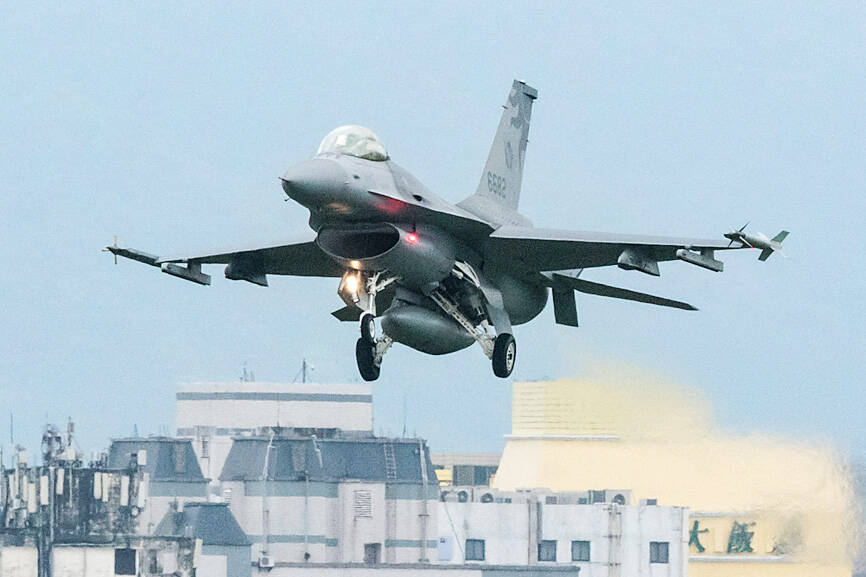Taiwan has signed an NT$11.25 billion (US$345.5 million) contract with the US to procure infrared search and track (IRST) systems that, according to a military source, are to be used for F-16V jets.
A notice posted yesterday on the Government e-Procurement System said that the deal to procure the systems was signed by the Ministry of Defense’s Defense Mission to the US and the American Institute in Taiwan on June 25.
The contract is valid from the day it was signed to Dec. 31, 2030.

Photo: Yasuyoshi Chiba, AFP
The systems, which were first announced in an arms sale package of the IRST systems and 16 related items on Aug. 23 last year, would be used on Taiwan’s fleet of 66 F-16V jets ordered from the US, a military source with knowledge of the matter said.
According to the notice on the procurement system, the contract’s supervising agency is the air force, with an address corresponding to the Zhi-Hang Air Base in Taitung County, where the F-16Vs are to be stationed.
The ministry said the new-generation IRST systems were developed specifically for the F-16V and would vastly enhance the fighters’ target acquisition and tracking capabilities, as well as their overall air combat performance.
Shu Hsiao-huang (舒孝煌), an expert at the Institute for National Defense and Security Research, last year told reporters that the IRSTs could be effectively deployed against China’s fifth-generation fighters.
The systems are capable of picking up heat signatures emitted by aircraft such as engine exhausts, and heat generated by friction between the fuselage and the air, giving it the upper hand on China’s new fighters, which would be otherwise hard to detect due to their compact radar cross-section, Shu said.

ENDEAVOR MANTA: The ship is programmed to automatically return to its designated home port and would self-destruct if seized by another party The Endeavor Manta, Taiwan’s first military-specification uncrewed surface vehicle (USV) tailor-made to operate in the Taiwan Strait in a bid to bolster the nation’s asymmetric combat capabilities made its first appearance at Kaohsiung’s Singda Harbor yesterday. Taking inspiration from Ukraine’s navy, which is using USVs to force Russia’s Black Sea fleet to take shelter within its own ports, CSBC Taiwan (台灣國際造船) established a research and development unit on USVs last year, CSBC chairman Huang Cheng-hung (黃正弘) said. With the exception of the satellite guidance system and the outboard motors — which were purchased from foreign companies that were not affiliated with Chinese-funded

PERMIT REVOKED: The influencer at a news conference said the National Immigration Agency was infringing on human rights and persecuting Chinese spouses Chinese influencer “Yaya in Taiwan” (亞亞在台灣) yesterday evening voluntarily left Taiwan, despite saying yesterday morning that she had “no intention” of leaving after her residence permit was revoked over her comments on Taiwan being “unified” with China by military force. The Ministry of the Interior yesterday had said that it could forcibly deport the influencer at midnight, but was considering taking a more flexible approach and beginning procedures this morning. The influencer, whose given name is Liu Zhenya (劉振亞), departed on a 8:45pm flight from Taipei International Airport (Songshan airport) to Fuzhou, China. Liu held a news conference at the airport at 7pm,

Taiwan was ranked the fourth-safest country in the world with a score of 82.9, trailing only Andorra, the United Arab Emirates and Qatar in Numbeo’s Safety Index by Country report. Taiwan’s score improved by 0.1 points compared with last year’s mid-year report, which had Taiwan fourth with a score of 82.8. However, both scores were lower than in last year’s first review, when Taiwan scored 83.3, and are a long way from when Taiwan was named the second-safest country in the world in 2021, scoring 84.8. Taiwan ranked higher than Singapore in ninth with a score of 77.4 and Japan in 10th with

GRIDLOCK: The National Fire Agency’s Special Search and Rescue team is on standby to travel to the countries to help out with the rescue effort A powerful earthquake rocked Myanmar and neighboring Thailand yesterday, killing at least three people in Bangkok and burying dozens when a high-rise building under construction collapsed. Footage shared on social media from Myanmar’s second-largest city showed widespread destruction, raising fears that many were trapped under the rubble or killed. The magnitude 7.7 earthquake, with an epicenter near Mandalay in Myanmar, struck at midday and was followed by a strong magnitude 6.4 aftershock. The extent of death, injury and destruction — especially in Myanmar, which is embroiled in a civil war and where information is tightly controlled at the best of times —